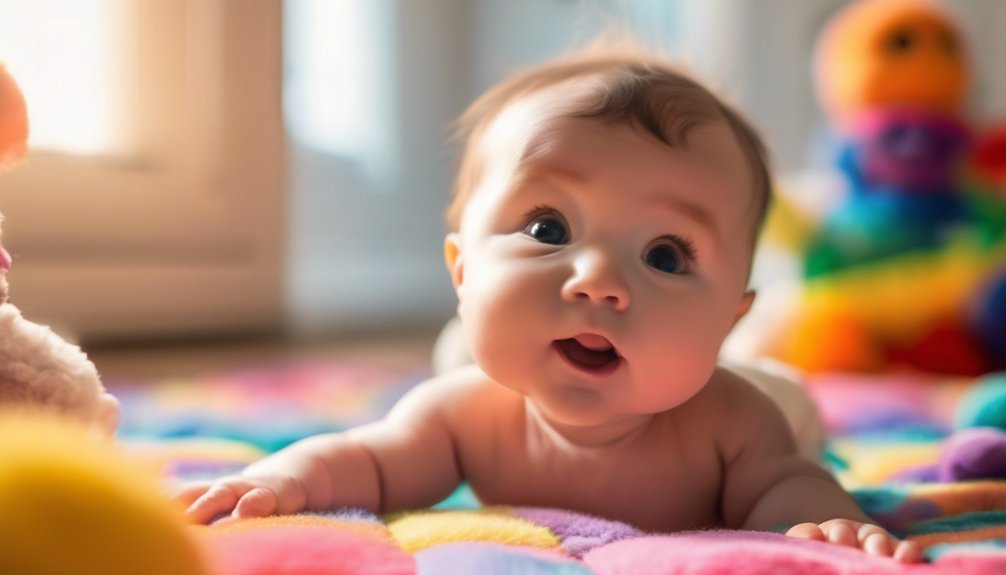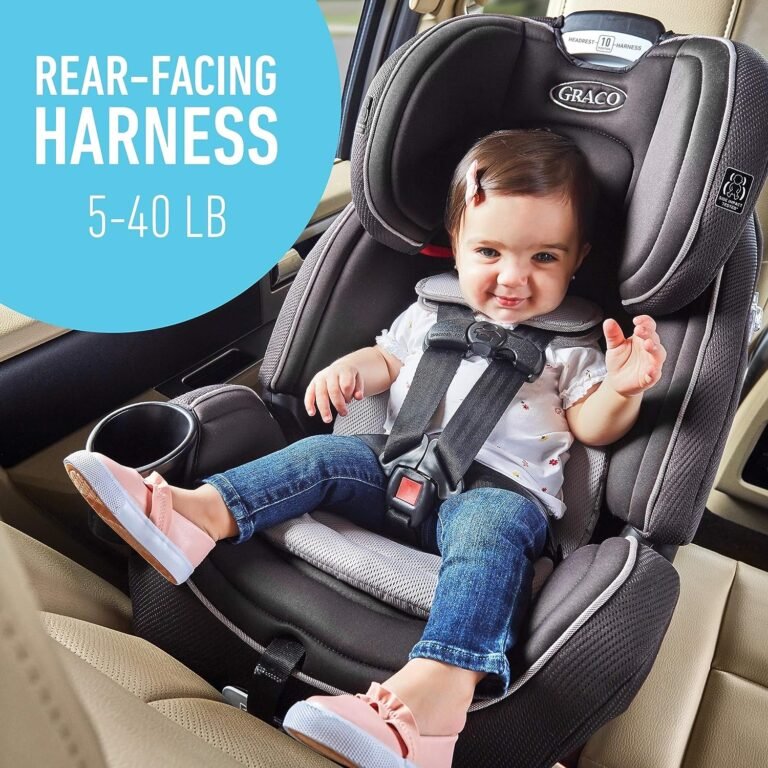Baby’s First Words: When and How
Did you know that a baby’s first words often reflect their social interactions more than their cognitive skills? As parents, you play a crucial role in shaping this momentous milestone. Understanding the timeline and factors influencing language acquisition can help you support your child’s journey. So, what signs should you look for to know when your baby is ready to speak, and how can you foster their communication skills effectively?
Key Takeaways
- Babies typically say their first intentional words, like “mama” or “dada,” between 10-12 months of age.
- Vocabulary expands from 5-20 words during the 12-18 month period as exposure increases.
- Engaging with babies through talking, singing, and reading significantly enhances language acquisition.
- Playful activities, such as storytelling and puppet shows, foster speech development and vocabulary growth.
- Recognizing signs of speech readiness, like increased babbling and imitation, helps parents support language development effectively.
Understanding Language Development Milestones
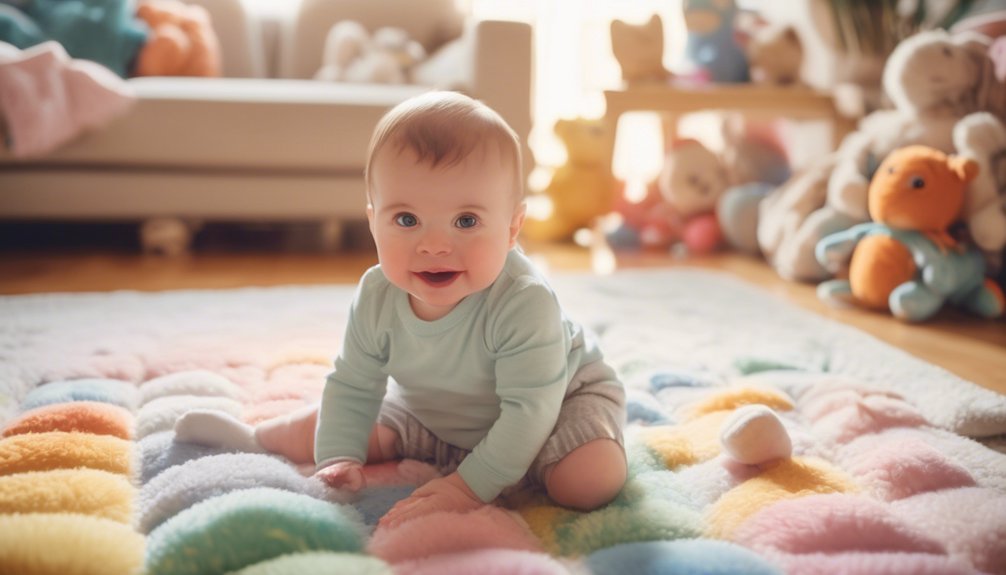
Language development milestones are crucial indicators of your baby’s growth, and understanding them can help you nurture their communication skills effectively.
As your baby interacts with the world, language exposure plays a vital role in shaping their abilities. From cooing to babbling, each sound is a stepping stone toward more complex speech.
It’s essential to remember that developmental variations are normal; every child progresses at their own pace. Engaging in conversations, reading aloud, and singing can enrich your baby’s language environment, fostering their confidence and curiosity.
The Typical Timeline for Baby’s First Words
As your baby approaches their first words, you’ll notice a remarkable progression from simple sounds to meaningful speech. Typically, this journey begins around 10 to 14 months, marking the crucial first word timeline in your child’s speech development stages. Understanding this process can enhance your connection with your little one.
| Age Range | Expected Milestone |
|---|---|
| 6-9 months | Babbling, vowel-consonant combinations |
| 10-12 months | First intentional words like “mama” or “dada” |
| 12-18 months | Vocabulary growth, 5-20 words |
| 18-24 months | Two-word phrases emerge |
Factors Influencing Language Acquisition
While many parents eagerly await their baby’s first words, several factors significantly influence when and how this milestone occurs. One crucial element is cognitive development; a baby’s brain undergoes rapid changes during the first few years, laying the groundwork for language skills.
You’ll notice that as your little one engages in play and exploration, they’re also building connections that support speech.
Social interaction plays an equally important role. The more you talk, sing, and read to your baby, the richer their language experience becomes. These interactions not only stimulate their desire to communicate but also help them understand the nuances of language.
The Role of Environment in Language Learning
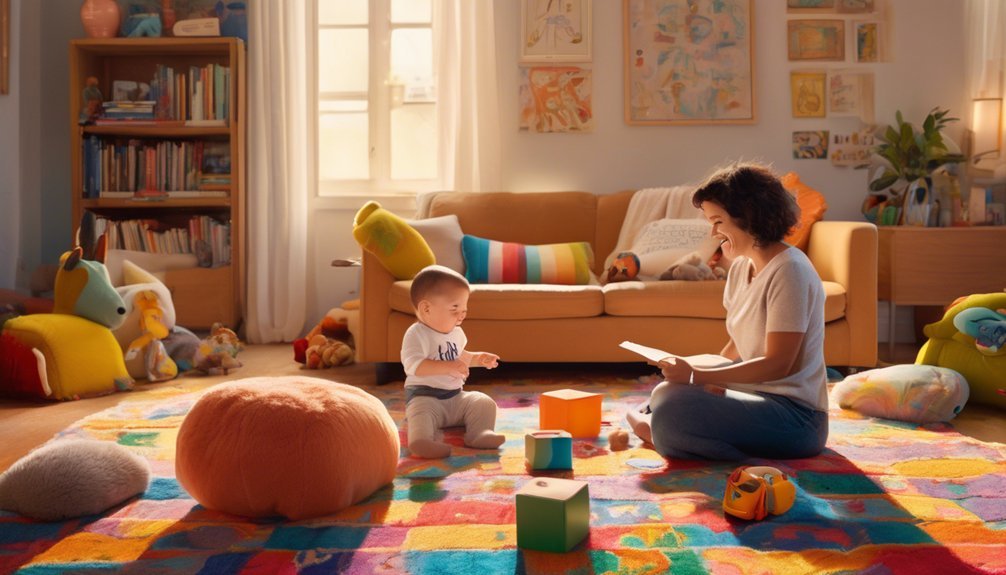
Creating a rich linguistic environment is essential for your baby’s language development. Surrounding your little one with varied social interactions and auditory input fosters their linguistic exposure.
Engaging in conversations, singing, or reading together boosts their understanding and encourages communication. Sensory experiences, from the sounds of your household to the cultural influences in your life, shape how they perceive language.
Family dynamics play a crucial role; a supportive and interactive atmosphere promotes confidence. Additionally, as your baby encounters peer interactions, they’ll learn to adapt their language skills to different contexts.
Prioritizing environmental stimulation, like varied sounds and conversations, ensures your child thrives in their language journey, laying a strong foundation for future communication.
Importance of Parent Interaction
When you interact with your baby, you’re not just sharing words; you’re building the very foundation of their language skills. Parental engagement fosters a rich environment for interactive communication, essential for your baby’s development. By talking, singing, or simply responding to their coos, you encourage their understanding of language patterns and emotional cues.
| Interaction Type | Impact on Language Skills | Example Activity |
|---|---|---|
| Talking | Expands vocabulary | Daily conversations |
| Singing | Enhances rhythm & tone | Lullabies or songs |
| Reading | Introduces new concepts | Storytime routines |
| Responding | Validates attempts | Mimicking their sounds |
| Playing | Encourages expression | Interactive games |
Your engagement shapes their world, making language an intimate bond between you.
Encouraging Speech Through Play
Play serves as a powerful tool for encouraging speech development in your baby, as it transforms learning into an enjoyable experience.
Through playful interactions, you create a nurturing environment that fosters language skills. Here are some engaging activities to consider:
- Imaginative storytelling: Spark your baby’s creativity and vocabulary by creating fun stories together.
- Musical games: Sing songs and incorporate rhythm to enhance verbal expression and memory.
- Role playing activities: Use costumes or puppets to encourage dialogue and social skills.
- Hands-on crafts: Engage in sensory experiences that introduce new words while exploring textures and colors.
These activities not only support speech but also deepen your bond, creating a rich tapestry of language and love as your baby begins to find their voice.
The Impact of Reading on Language Skills
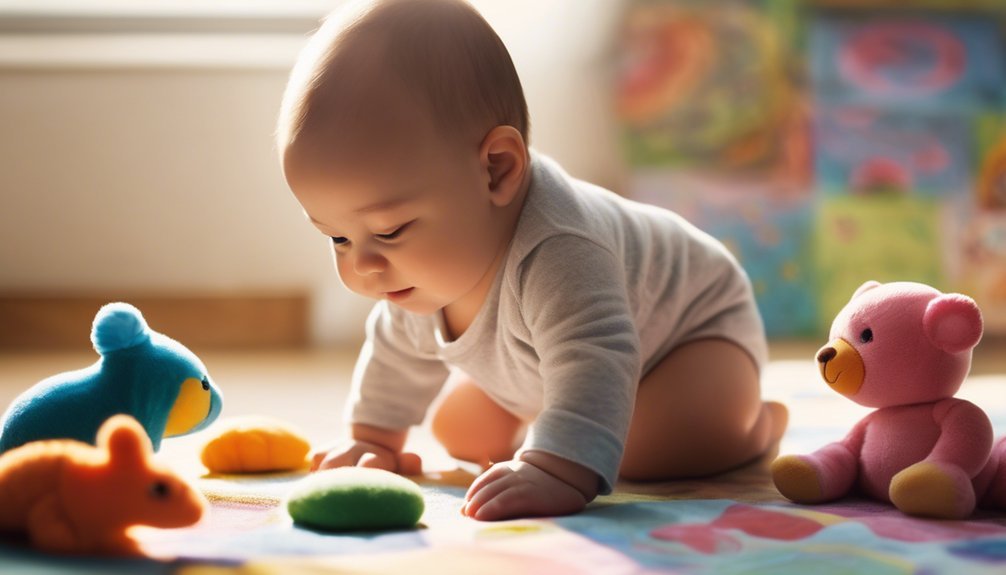
Reading plays a crucial role in developing your baby’s language skills, as it exposes them to new vocabulary, sentence structures, and concepts. The frequency of reading together can significantly impact their linguistic growth.
When you make reading a daily routine, you’re not just bonding; you’re actively engaging in vocabulary expansion. Each story introduces your little one to diverse words and ideas, nurturing their understanding of language in a natural, enjoyable way.
As they hear you articulate different phrases, they pick up nuances and rhythm, laying the foundation for their own speech. So, cuddle up with a book and let the magic unfold; the more you read, the richer their language experience becomes, setting them up for future communication success.
How to Choose the Right Words
Choosing the right words for your baby’s first vocabulary can feel overwhelming, but it doesn’t have to be. Focusing on word selection that resonates is key.
Start by introducing meaningful phrases that relate to their everyday experiences. Here are some suggestions:
- Family names: Create connections with loved ones.
- Common objects: Help them recognize their surroundings.
- Simple emotions: Teach feelings like “happy” or “sad.”
- Daily routines: Use words associated with feeding or bedtime.
Non-Verbal Communication as a Foundation
While selecting words is a significant step in helping your baby communicate, understanding non-verbal cues forms the backbone of their early interactions. Your baby’s gestures and facial expressions convey powerful messages even before they can speak. By tuning into these signals, you can foster a deeper connection.
| Gestural Communication | Facial Expressions | Meaning |
|---|---|---|
| Reaching for you | Smiling | Desire for closeness |
| Waving | Frowning | Need for attention |
| Pointing | Wide-eyed | Curiosity or surprise |
| Clapping | Pouting | Excitement or frustration |
Recognizing these non-verbal cues helps you respond appropriately, ensuring your baby feels understood and loved as they begin their journey toward verbal communication.
Recognizing Your Baby’s Unique Pace
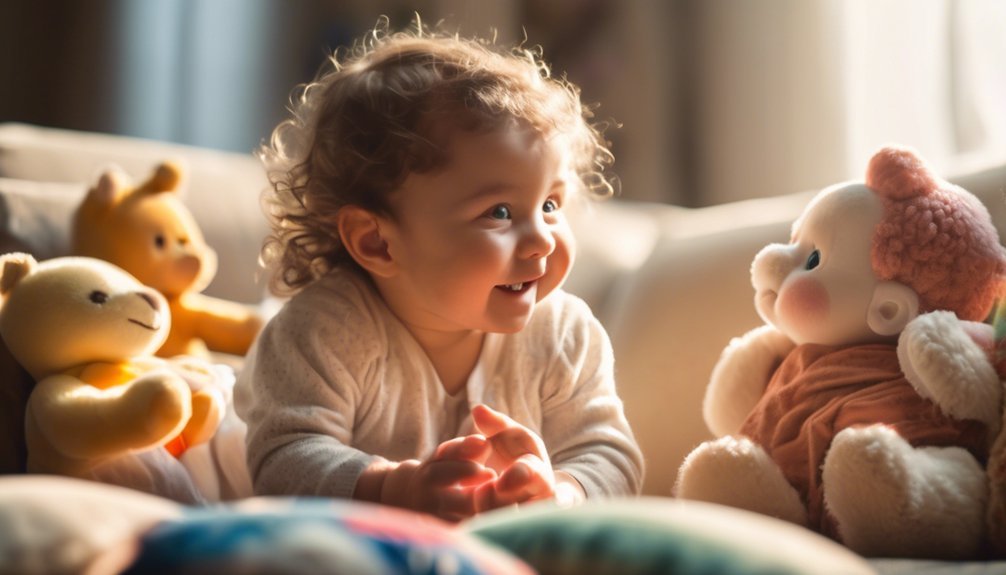
Every baby develops at their own pace, and it’s essential to understand that your little one may not follow a set timeline when it comes to speaking their first words.
Recognizing these individual differences is vital for fostering a nurturing environment. Here are some key points to remember:
- Babies may experiment with sounds before forming words.
- Each child has unique timelines influenced by their personality and experiences.
- Factors like exposure to language and emotional connections play a significant role.
- Encouragement and patience can help your baby feel secure in their journey.
Signs That Your Baby Is Ready to Speak
As your baby grows and develops, you might notice several signs indicating that they’re ready to start speaking. One of the first baby cues is their increased babbling; you may hear them experimenting with different sounds.
They might also respond to your speech, turning their head or looking at you when you talk. If you notice your baby imitating sounds or gestures, it’s another sign of speech readiness.
When they start to understand simple commands, like “come here,” this indicates they’re grasping language concepts. Additionally, pay attention to their facial expressions and body language, as these often convey their feelings and thoughts.
Recognizing these signs can help you support your little one’s journey into the wonderful world of words.
Fun Activities to Promote Early Speech
To spark your baby’s interest in language, engaging in fun activities can make a significant difference. Incorporating playful elements into your routine not only fosters connection but also encourages speech development.
Here are some activities you might consider:
- Storytelling sessions: Use expressive voices to captivate your baby’s attention.
- Puppet shows: Create characters that animate your stories, enhancing engagement.
- Interactive games: Simple games like “peek-a-boo” boost sound exploration and word association.
- Rhythm exercises: Clap or tap along to playful songs, introducing new words through rhythm.
These activities help nurture your baby’s speech in a joyful environment, making learning enjoyable and intimate.
Frequently Asked Questions
What Are Common First Words Babies Typically Say?
Your baby’s favorite first words often include “mama,” “dada,” and “bye-bye.” These words form the foundation of their vocabulary, reflecting their growing awareness and connection to you and the world around them. It’s a beautiful journey.
How Can I Tell if My Baby Is Behind in Speech?
You can tell if your baby’s behind in speech by tracking speech milestones. If they’re not reaching key language development stages by certain ages, consider discussing your concerns with a pediatrician for guidance and support.
Are There Specific Sounds Babies Make Before Saying Words?
Before forming words, your baby dances through cooing sounds and playful babbling stages, like a budding artist experimenting with colors. These sounds reflect their growing communication skills, paving the way for future speech development.
What Should I Do if My Baby Isn’T Talking by Age Two?
If your baby isn’t talking by age two, consider consulting a pediatrician. Early intervention for speech delay can significantly enhance their language development, ensuring they receive the support needed for their communication journey. You’re not alone.
Can Bilingual Exposure Delay My Baby’s First Words?
Bilingual exposure won’t necessarily delay your baby’s first words; in fact, it can enhance language acquisition. Embracing bilingual benefits enriches their vocabulary and cognitive skills, fostering a deeper connection to both languages you share with them.
Conclusion
In the journey of your baby’s language development, remember that “a journey of a thousand miles begins with a single step.” By engaging in conversation, reading, and creating a nurturing environment, you’re setting the stage for their first words. Every child progresses at their own pace, so be patient and observant. Celebrate each milestone, no matter how small, as these moments are crucial for fostering communication skills that will shape their future social interactions.

